How to protect yourself against malware and phishing websites
What for: To keep your protection up to date.
Firefox developers consistently add new features and fix vulnerabilities, so it is important to use the latest version of the app. Make sure you have automatic update installation enabled on your smartphone.
- Open Play Store;
- Tap your avatar in the right part of the search field;
- Go to the Settings section, then tap Network preferences;
- Tap Auto-update apps;
- Choose if updates should be downloaded over any network or over Wi-Fi only.
- Tap Done.
Downside: All apps, not just Firefox, will be updated automatically. It may use up a lot of your data plan.
What for: To revoke unwanted website permissions
Some websites may ask your browser for permission to access other applications, smartphone components or information about you. For example, a weather website can show more relevant results if it uses your location info. However, this can also be used by attackers to spy on you through your webcam or to install malicious add-ons. Check the list of permissions and recall undesired ones from suspicious websites:
- Tap the three dots in the lower right corner of the screen;
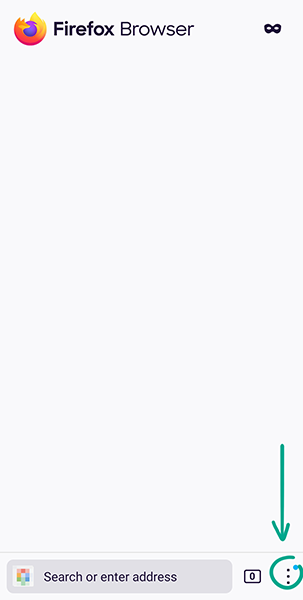
- Select Settings;
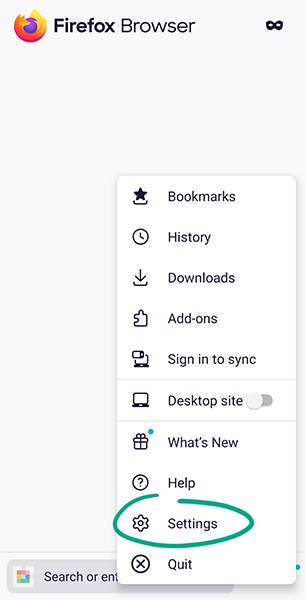
- Go to the Site permissions section;
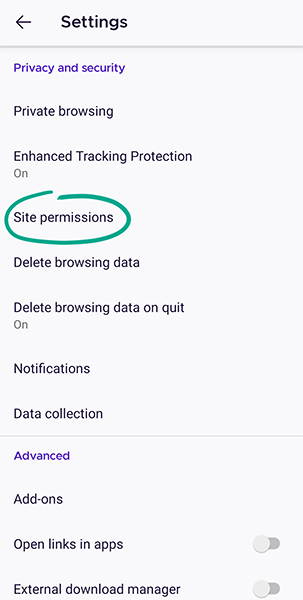
- To block all sites from accessing a feature, select it from the list of permissions and tap Block;
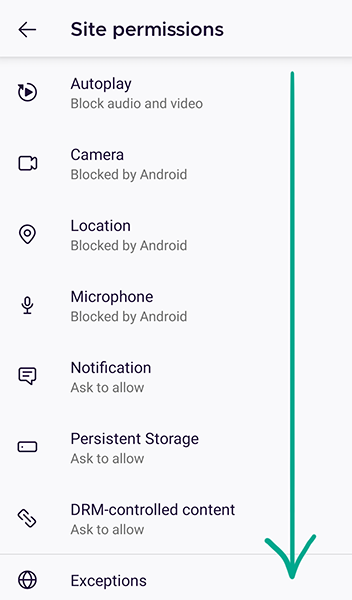
- To revoke a permission from particular websites, select the feature and remove such websites from the list.
How to hide your data from prying eyes
What for: To leave no tracks.
Firefox normally stores data about the pages you open, the passwords you enter and other browser usage information. If you want to hide that information and when using someone else's smartphone, you can switch to private browsing. To open a private tab, tap the mask icon on the start screen.
After you close the browser, all of the browsing history for private tabs will be automatically deleted from the app. Keep in mind that private browsing only applies to data stored by the browser itself. Your Internet service provider or your employer (in case you are connected to an enterprise network) will be able to see what pages you have visited.
What for: So that strangers do not see traces of your activity.
By default, your home page displays frequently visited sites. If you are in a public space, strangers might see them. To hide this information:
- Tap the three dots in the lower right corner of the screen;
- Select Settings;
- Go to the Customize section;
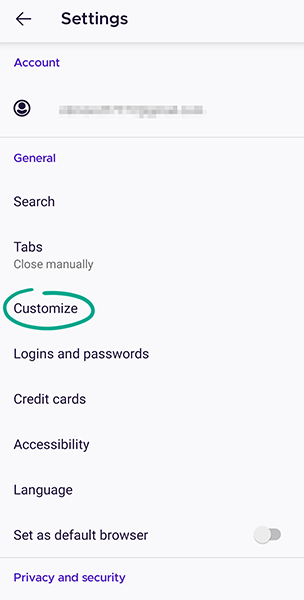
- Turn off Show most visited sites.
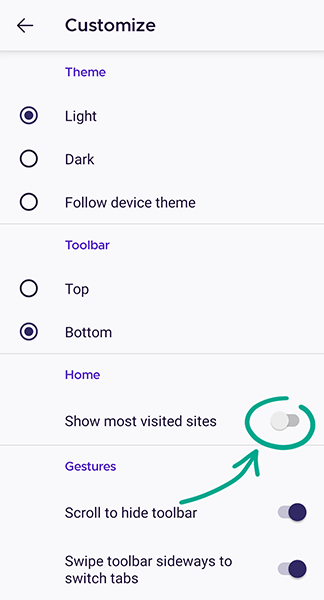
What for: To hide frequently visited websites from strangers.
When you type a request into the address or search bar, Firefox first suggests websites from your bookmarks, open pages, browsing history, and top websites. This helps locate your frequently visited websites faster. However, if there are other people around, they will also be able to see them. To hide this information, disable search suggestions:
- Tap the three dots in the lower right corner of the screen;
- Select Settings;
- Go to the Search section;
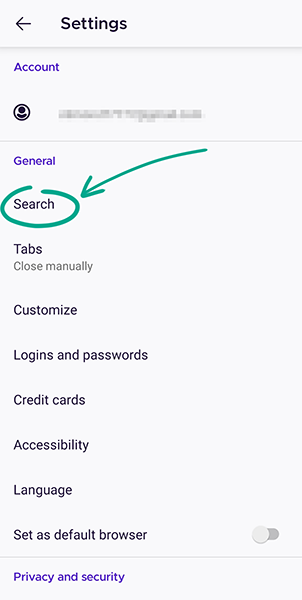
- Disable the following:
- Show clipboard suggestions;
- Search browsing history;
- Search bookmarks;
- Search synced tabs;
- Show search suggestions.
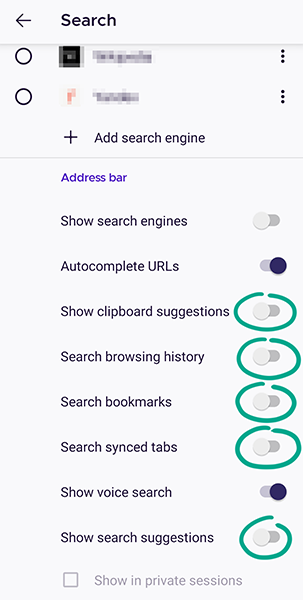
What for: To leave no traces of your activity.
By default, all the pages you visit and all your downloads get logged. This allows you to go back to any page you have viewed or any file you have downloaded. However, if a stranger gains access to your smartphone, they may see your entire browsing history, too. You can set the browser to automatically delete your browsing history on quitting the app.
- Tap the three dots in the lower right corner of the screen;
- Select Settings;
- Tap Delete browsing data on quit to enable this function;
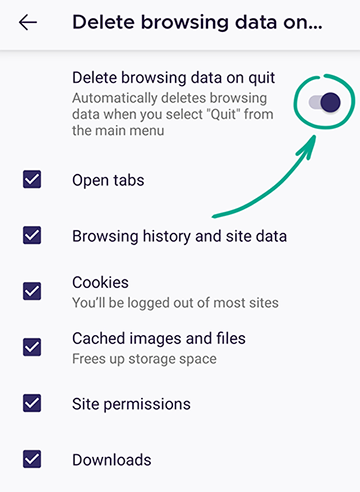
- If necessary, select which data you would like to delete after closing the app.
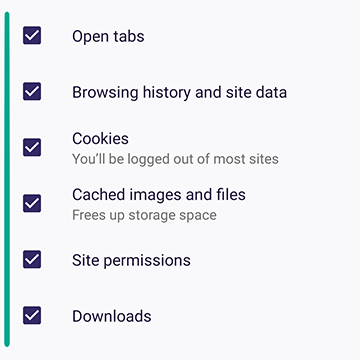
Downside: If you delete your browsing history, you will need to recall the names or addresses of the websites that contain important information.
How to keep corporations out of your business
What for: To find a balance between privacy and comfort.
Website owners and advertising companies are eager to gather as much information about you as possible. To do this, they use various tracking tools, such as:
- Social media trackers — snippets of code that social networks post on their own and third-party websites. For example, Facebook might embed this type of code in the "share" button on a news portal to find out what websites you visit and track your interests.
- Cookies — small objects containing information about your system and page settings that the website saves on your device.
- Fingerprinters — scripts that record information about your browser and computer, such as the screen resolution, system language, installed extensions and other settings.
- Other tracking elements — code snippets embedded in website content, such as banners, buttons, video players and other page elements.
Using the collected data, various companies create a unique profile of your device to remember your website settings and serve up targeted advertising.
Firefox blocks some of these scripts by default and prevents browser-based cryptominers — malicious objects that attackers use to make money at the expense of your device's resources without your permission — from running.
You can turn on a stricter protection mode to further thwart surveillance or customize the protection to meet your needs.
- Tap the three dots in the lower right corner of the screen;
- Select Settings;
- Go to the Enhanced Tracking Protection section;
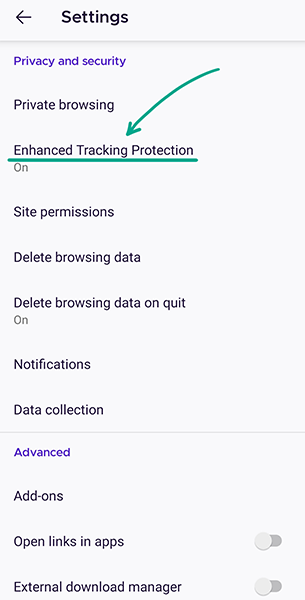
- Select the level that best suits you:
- Standard (default). Firefox will block social media trackers, cross-website cookies, fingerprinters and cryptominers on all open pages. It will also block other trackers, but only in private browsing windows.
- Strict. Firefox will block social media trackers, cross-website cookies, fingerprinters, cryptominers and other trackers on all pages.
- Custom. You can choose which cookies and other tracking elements the browser will block.
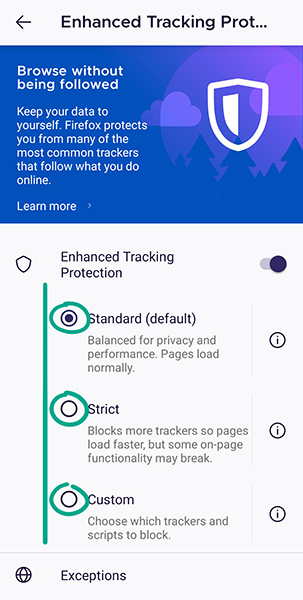
Bear in mind that blocking all cookies and trackers can stop some webpages from functioning properly. You can disable tracking prevention for such webpages if you are sure they are safe:
- Tap the shield icon to the left of the address bar;
- In the drop-down list, disable Enhanced Tracking Protection.
What for: To stop Firefox developers from gathering extra information about you.
Firefox may collect information about the pages you visit, as well as browser technical data and other information. The developers declare they use such data to improve the app and fix bugs. However, it means that data about your browsing will be stored on the company's servers. If you want to avoid it, you can turn off data collection:
- Tap the three dots in the lower right corner of the screen;
- Select Settings;
- Go to the Data collection section;
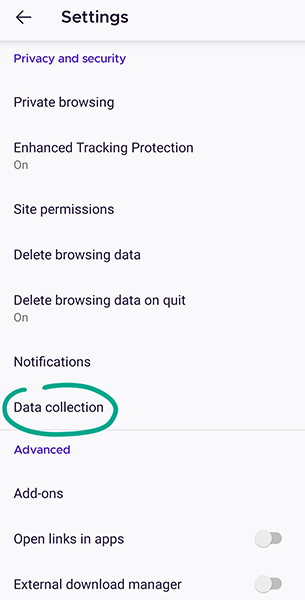
- Disable the following:
- Usage and technical data
- Marketing data
- Studies
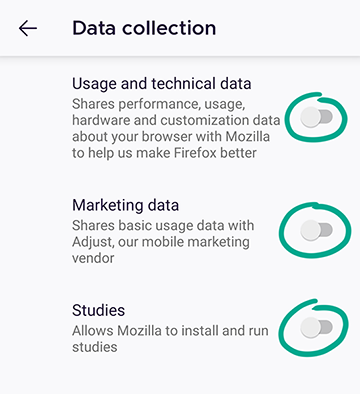
What for: To stop the browser developers from storing your online activity information on their servers.
Firefox can sync your browsing history, passwords, bookmarks and other data between devices where you log in to the browser account. For example, when you bookmark a website on your computer, you'll be able to find it among favorites on your smartphone. Syncing is only possible if the browser stores your personal information on its developers’ servers. To avoisd that, turn off the syncing.
- Tap the three dots in the lower right corner of the screen;
- Select Settings;
- Tap your account icon above the menu;
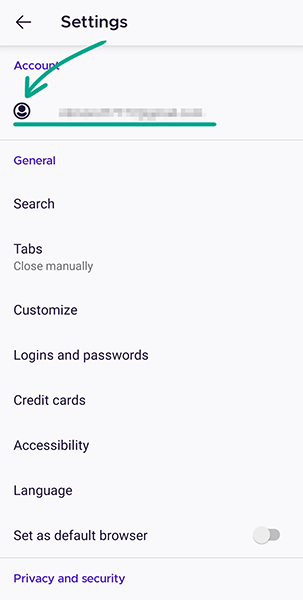
- Uncheck all items in the Choose what to sync list.
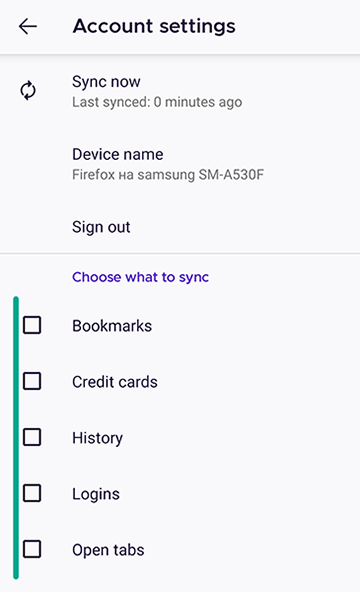
This will stop the browser on the device from syncing information, but you will have to deactivate sync separately on other devices.
Downside: You will only have access to saved passwords, bookmarks and other data from the device where you save them.
What for: To keep search giants from gathering information about you.
Most search engines, such as Google or Bing, store user information and queries. This allows these companies to show customized search results and promote their services. However, some engines — such as DuckDuckGo — do not collect any such data. If you prefer to stay anonymous, you can assign this service as the default search engine.
- Tap the three dots in the lower right corner of the screen;
- Select Settings;
- Go to the Search section;
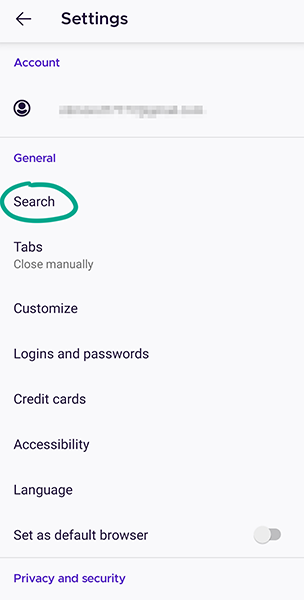
- Select DuckDuckGo.
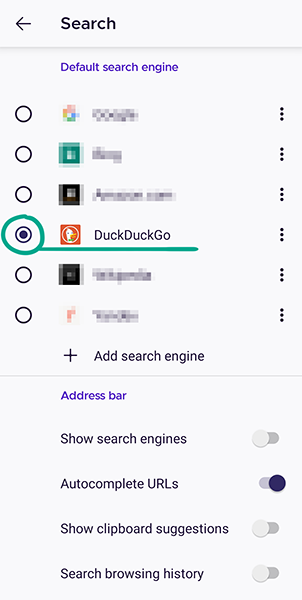
How to protect your data
What for: To prevent account hijacking.
When you sign in to a website, Firefox prompts you to save your login and password. Next time you visit the website, the browser will automatically fill in your credentials. However, stored passwords can fall prey to leaks. To be on the safe side, disable autofill and remove stored passwords from the browser:
- Tap the three dots in the lower right corner of the screen;
- Select Settings;
- Go to the Logins and passwords section;
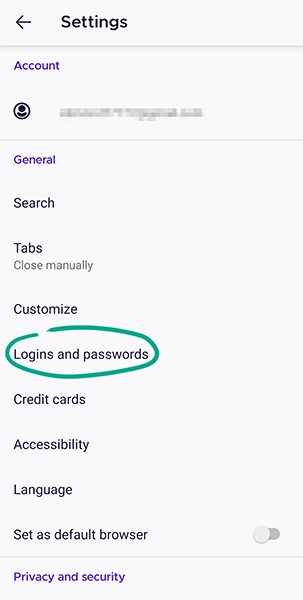
- Turn off Autofill;
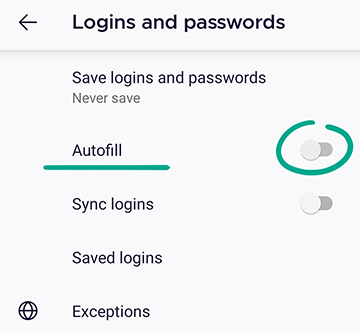
- To prevent the browser from prompting you to save logins and passwords, tap Save logins and passwords and select Never save;
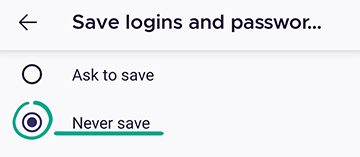
- To delete all of your saved passwords, tap Saved logins and verify your identity;
- Select the account and password that you would like to delete;
- Tap the three dots in the upper right corner of the screen, select Delete, and confirm.
Downside: You will have to manually enter logins and passwords every time you sign in.
You can avoid the inconvenience and improve the security of your accounts using a password manager. Unlike a browser, it does not access third-party resources on the Web, which means it is protected from malicious websites. Moreover, it cannot be hacked through a vulnerable extension or plug-in, while browsers can.







